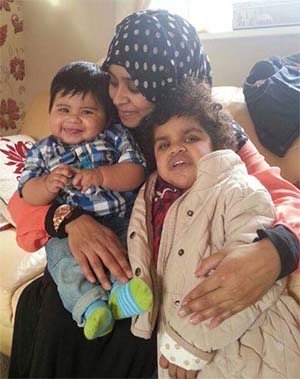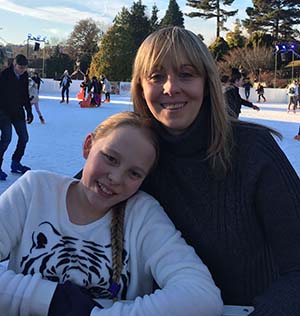We hope people have been inspired by Phil Mitchell’s transplant in EastEnders
This Christmas Day, Phil Mitchell in EastEnders has received a liver transplant from an anonymous deceased donor.
NHS Blood and Transplant has been providing guidance to the EastEnders research team. This included setting up research interviews with real transplant patients, whose personal experiences inspired elements of the storyline.
 Monira Khanom, 36, of Telford, was one of the people the EastEnders team spoke to. She suffered liver failure from an unknown cause in 2015 and a transplant saved her life.
Monira Khanom, 36, of Telford, was one of the people the EastEnders team spoke to. She suffered liver failure from an unknown cause in 2015 and a transplant saved her life.
Monira said: “I explained what encephalopathy was to the EastEnders team and how it affects you. You become very confused. I explained how as the days went by in the hospital, I couldn't answer all the questions from the nurses – it was a sign that I was slipping away.
“I don’t know who the donor was but I'll never be able to thank my donor and their family enough in words.
“I hope the EastEnders storyline will highlight the difficulties of living with liver disease and make more people join the NHS Organ Donor Register.”
NHS Blood and Transplant is currently running a Christmas campaign urging people to take a few minutes to join the NHS Organ Donor Register. While most people (81%) say they support organ donation, only around a third of people in the UK (23.3 million) have joined the NHS Organ Donor Register.
Sally Johnson, Director of Organ Donation and Transplantation for NHS Blood and Transplant, said: “We really appreciate EastEnders commitment to portraying this major storyline responsibly. We’re grateful they have chosen to show Phil receiving a transplant from an anonymous deceased donor. Most patients, just like Phil, will rely on the bravery and generosity of a bereaved family they will never meet.
“This Christmas, we are asking everyone who supports organ donation to take just a few minutes of their time online to show their support for donation by joining the NHS Organ Donor Register.”
Real people around the country have had transplants this Christmas, just like Phil. Those transplants were only possible because families who faced the grief of losing a loved one at this time of year made the brave and generous decision to say yes to organ donation.
 Kim Fairman, 36, from Crawley, spent Christmas Day 2012 waiting for a lifesaving liver transplant for MDR3 deficiency disease.
Kim Fairman, 36, from Crawley, spent Christmas Day 2012 waiting for a lifesaving liver transplant for MDR3 deficiency disease.
She said: “I thought I would not be around to watch my daughter open her presents on Christmas morning.
“I wrote her a letter telling her how much I loved her and what all my hopes and dreams for her were. I managed to get hold of a recordable story book of our favourite Christmas story so that she could play it on Christmas Eve if I wasn't there to read it to her, and made plans for where she would live.
“I tried to also make it a magical time for her but deep down all I wanted to do was sleep and cry.
“When I finally got the call to come in and have my liver transplant it was a life changing day! I was going to live and I was going to watch my daughter grow up and get married.
“I will never forget my donor or his family and will be forever grateful for them for letting me stay with my family and watch them grow.”
Sadly, right now across the UK there are still around 6,500 people - including 150 children - living a life in limbo, waiting for a call that will change their lives. Around three people die a day in need of an organ – that would be around 75 people between Phil signing his transplant consent forms on December 1 and receiving a transplant on Christmas Day.
Please join the NHS Organ Donor Register today at www.organdonation.nhs.uk
Ends
Contact:
- For additional media information please contact 01923 367600 or pressoffice@nhsbt.nhs.uk
- For out of hours enquiries please call: 0117 969 2444
Notes to editors:
- NHS Blood and Transplant is a joint England and Wales Special Health Authority. We are responsible for ensuring a safe and efficient supply of blood and associated services to the NHS in England. We are also the organ donation organisation for the UK and are responsible for matching and allocating donated organs.
- We are an essential part of the NHS and take pride in saving and improving lives by making the most of every voluntary donation, from blood and organs to tissues and stem cells.
- Our work would not be possible without our donors - ordinary people doing extraordinary things by saving and improving the lives of others.
- To find out more visit: www.nhsbt.nhs.uk
- It is quick and easy to join the NHS Organ Donor Register. Visit www.organdonation.nhs.uk or contact our 24 hour a day donor line - 0300 123 23 23.
- The register records your decision on whether you want to donate your organs and/or tissue after your death to save and improve the lives of others. It is used by authorised medical staff to establish whether someone has registered an organ donation decision.
- Letting your family know your organ donation decision will make it much easier for them to support what you want.
- Every day across the UK around three people who could have benefited from a transplant die because there aren’t enough organ donors. We need more people to agree to organ donation
- Anyone can join the NHS Organ Donor Register, age and medical conditions are not necessarily a barrier to donation.
- One donor can save or transform up to nine lives through organ donation and transform even more by donating tissue.
- There is a particular need for more black and Asian organ donors. Patients from Black, Asian and Minority Ethnic (BAME) communities are over-represented on the transplant waiting list. More than a quarter (26%) of those on the waiting list are Black, Asian or Minority Ethnic while a 1/3 of people on the kidney waiting list are from these communities. People from Black and Asian communities have a higher incidence of conditions such as diabetes and certain forms of hepatitis, making them more likely to need a transplant. Black, Asian and Minority Ethnic patients make up a third of the active kidney transplant waiting list. Although some are able to receive a transplant from a white donor, for many the best match will come from a donor from the same ethnic background. Black, Asian and Minority Ethnic donors are needed to improve the chances of these patients getting the kidney transplant they need.
- Whilst there may be some individual concerns relating to religious or cultural practices, all the major religions support organ donation.
